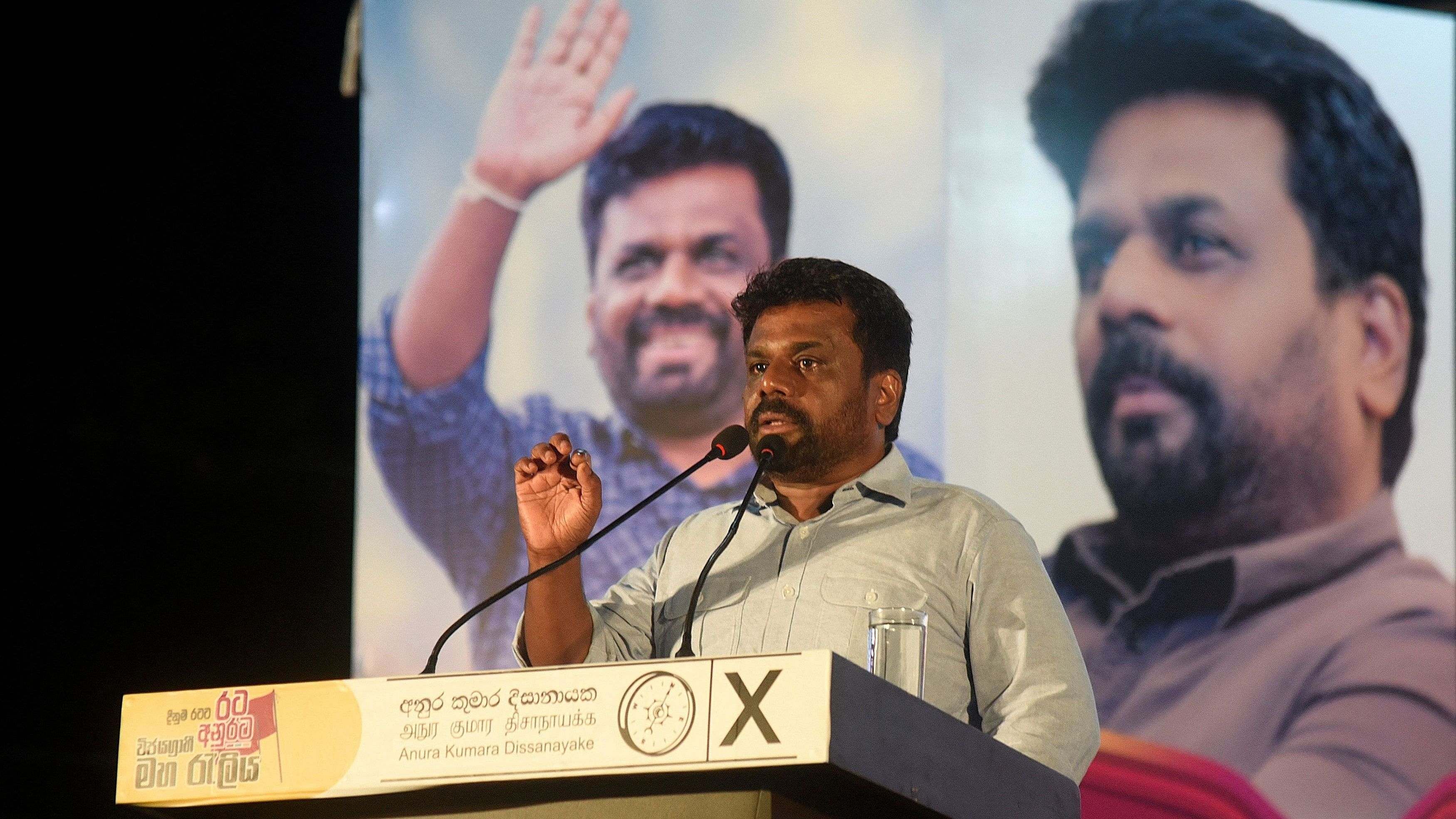
Anura Kumara Dissanayake.
Credit: Reuters photo
Chennai: Anura Kumara Dissanayake of the left-leaning Janatha Vimukthi Peramuna, which had in the past led an insurgency against the Indian Peacekeeping Force (IPKF) in 1987, was on Sunday elected as the 9th Executive President of Sri Lanka, marking the transfer of power from the “elite” to the “working class.”
55-year-old Dissanayake - who is an ally of China, a country which has been expanding its footprints in Sri Lanka - defeated Leader of Opposition Sajith Premadasa and incumbent Ranil Wickremesinghe, both pro-India, in a keenly contested election, the first after an unprecedented economic crisis hit the country, leading to the ouster of the Rajapaksas.
For the first time in Sri Lanka’s history, the polls went into a second round to calculate the preferential votes after neither Dissanayake nor Sajith secured the required 50 per cent of votes. The new President is expected to be sworn-in by Monday, after which he will appoint a secretary and about 15 cabinet ministers to run the government.
His challenges include continuing with his predecessor Ranil’s efforts to bail out the tattered economy, work with the IMF, and reduce taxes as promised during his campaign, besides reaching out to India, the country’s closest geographical neighbour.
Though JVP has long been known for fanning anti-India sentiments in Sri Lanka - the party did lead two insurgencies against the state in 1970 and 1987 - strategic analysts say the new President cannot completely ignore India and will certainly mend fences with New Delhi. India has been extremely generous towards Colombo after the island faced a never-seen before economic crisis in 2022.
Anura’s ascent to Sri Lankan Presidency is meteoric as he secured a mere 3.2 per cent votes in the 2019 Presidential polls that saw Gotabhaya Rajapaksa securing a landslide victory on national security plank following the deadly Easter blasts.
However, his key role in the 2022 Araghalya protests against the Rajapaksas and the political class caught the imagination of youngsters and old alike, who seem to have put their weight behind the Marxist-leaning party leader’s “anti-corruption” plank.
The results also showed deep divisions between the majority Sinhala and minorities like Tamils and Muslims. While Sajith and Ranil secured more votes in Tamil-dominated Vanni, Jaffna, Trincomalee, and Batticaloa, it was all the way Dissanayake in Sinhala-majority areas like Hambantota, the home district of the Rajapaksas. The new President swept 15 of the 22 districts, leaving just seven to his runner-up, Sajith.
“The dream we nurtured for a long time has finally come true. The victory is not an achievement of just one person’s work, but the collective effort of hundreds of thousands of Sri Lankan citizens,” Dissanayake said in his first comments after the Election Commission declared him the winner.
He also instantly reached out to the minorities by harping on a “fresh start” to “rewrite Sri Lankan history.” “The unity of Sinhalese, Tamils, Muslims, and all Sri Lankans is the bedrock of this new beginning. The New Renaissance we seek will rise from this shared strength and vision,” he added.
Ranil, the veteran politician who was pushed to the third position, congratulated Dissanayake on his victory after conceding defeat.
“I entrust to you the care of the beloved child, that is Sri Lanka,” Ranil said. Namal Rajapaksa, son of former President Mahinda, was decimated in the elections, with the family continuing to be punished by the people for pushing the country to a brink.
A ”fundamental change” in Sri Lanka’s political landscape was Dissanayake's war cry as he highlighted the sufferings of the masses during the economic crisis like 17-hour power cut, long queues outside shops, inflation soaring to new heights, and sky-rocketing prices of essential commodities in his campaign.
Anura’s victory truly marks a tectonic shift in Sri Lanka’s political landscape as this is the first time that a party representing the working class will be in power. However, Anura has an arduous task of convincing the international community that JVP, which had led two insurgencies in Sri Lanka in 1971 and 1987, will continue to steer Sri Lanka out of the crisis and ensure there is no trust deficit between his country and the West.
Anura should also live up to his promises of slash taxes to reduce burden on the people, while he should assure investors, including those from India, that their interests would be protected.